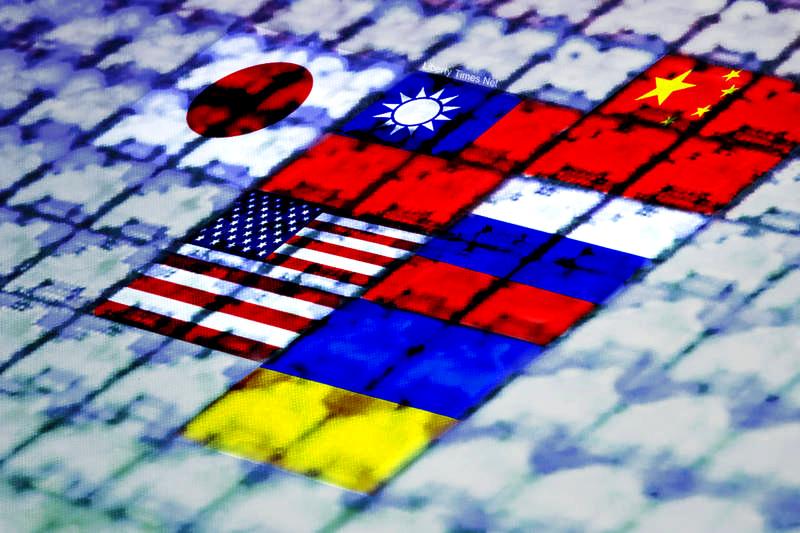Taiwan is not ruling out the possibility of imposing sanctions against Russia over its conflict with Ukraine, the Ministry of Economic Affairs said yesterday, highlighting the nation’s willingness to contribute to efforts to peacefully resolve international conflicts.
Russian President Vladimir Putin on Monday announced that his country would recognize breakaway regions in eastern Ukraine held by Russian-backed separatists, saying that “Russian peacekeepers” would be deployed to the so-called Donetsk People’s Republic and Luhansk People’s Republic.
The US and the EU condemned the move, announcing that those involved would be sanctioned.

Photo: Bloomberg and Taipei Times
The ministry said that if Taiwan imposes sanctions, they would include an export ban on semiconductors and other key components to Russia.
The sanctions would not negatively affect the domestic semiconductor industry, as chip exports to Russia are minimal, totaling only US$21.64 million in 2020, or 0.013 percent of the nation’s exports of US$15.55 billion, it said.
The ministry said it would continue to closely monitor the situation at the Russia-Ukraine border, adding that, as a member of the international community, Taiwan is willing to contribute to efforts to peacefully resolve conflicts.
A Foreign Policy report on Tuesday said that Taiwan — along with Singapore and Japan — supports US calls to implement restrictive export controls on Russia.
The US plan follows a relatively new pattern — dubbed the Foreign Direct Product Rule — which extends US jurisdiction over foreign-made products using US technology, the report said.
“All semiconductors on the planet are made with US software or tools in part, so this will catch any destined to Russia,” the report quoted former US assistant secretary of commerce for export administration Kevin Wolf as saying.
Foreign Policy also quoted other US sources as saying that some US allies in Asia are worried that China might adopt Russia’s playbook for launching an attack on Taiwan.
Top US diplomats, such as US Secretary of State Antony Blinken, are monitoring the Russia-Ukraine situation with regard to possible Western reactions to a Chinese attack on Taiwan, the sources were quoted as saying.

US President Donald Trump yesterday announced sweeping "reciprocal tariffs" on US trading partners, including a 32 percent tax on goods from Taiwan that is set to take effect on Wednesday. At a Rose Garden event, Trump declared a 10 percent baseline tax on imports from all countries, with the White House saying it would take effect on Saturday. Countries with larger trade surpluses with the US would face higher duties beginning on Wednesday, including Taiwan (32 percent), China (34 percent), Japan (24 percent), South Korea (25 percent), Vietnam (46 percent) and Thailand (36 percent). Canada and Mexico, the two largest US trading

ACTION PLAN: Taiwan would expand procurement from the US and encourage more companies to invest in the US to deepen bilateral cooperation, Lai said The government would not impose reciprocal tariffs in retaliation against US levies, President William Lai (賴清德) said yesterday, as he announced five strategies to address the issue, including pledging to increase Taiwanese companies’ investments in the US. Lai has in the past few days met with administrative and national security officials, as well as representatives from various industries, to explore countermeasures after US President Donald Trump on Wednesday last week announced a 32 percent duty on Taiwanese imports. In a video released yesterday evening, Lai said that Taiwan would not retaliate against the US with higher tariffs and Taiwanese companies’ commitments to

‘SPECIAL CHANNEL’: Taipei’s most important tasks are to stabilize industries affected by Trump’s trade tariffs and keep negotiations with Washington open, a source said National Security Council Secretary-General Joseph Wu (吳釗燮) arrived in the US for talks with US President Donald Trump’s administration, a source familiar with the matter said on Friday. Wu was leading a delegation for a meeting known as the “special channel,” the Financial Times reported earlier. It marked Trump’s first use of the channel since returning to the White House on Jan. 20. Citing a source familiar with the matter, the Financial Times reported that Minister of Foreign Affairs Lin Chia-lung (林佳龍) was also a part of the delegation. The visit came days after China concluded war games around Taiwan and amid Trump’s

CHIP EXCEPTION: An official said that an exception for Taiwanese semiconductors would have a limited effect, as most are packaged in third nations before being sold The Executive Yuan yesterday decried US President Donald Trump’s 32 percent tariff on Taiwanese goods announced hours earlier as “unfair,” saying it would lodge a representation with Washington. The Cabinet in a statement described the pledged US tariffs, expected to take effect on Wednesday next week, as “deeply unreasonable” and “highly regrettable.” Cabinet spokeswoman Michelle Lee (李慧芝) said that the government would “lodge a solemn representation” with the US Trade Representative and continue negotiating with Washington to “ensure the interests of our nation and industries.” Trump at a news conference in Washington on Wednesday announced a 10 percent baseline tariff on most goods